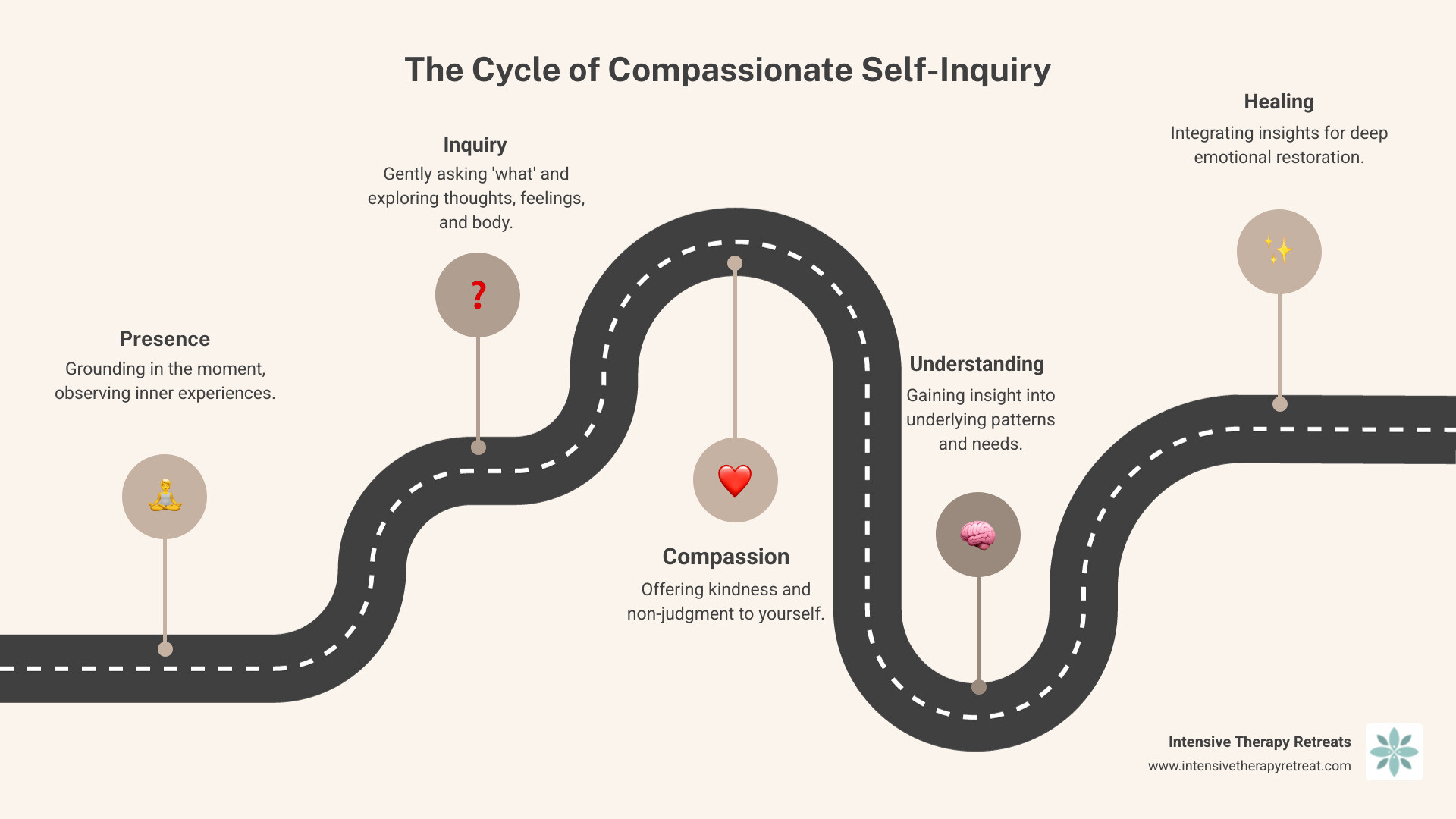Compassionate self inquiry: 4 Steps to Healing
What is Compassionate Self-Inquiry?
Compassionate self inquiry is a gentle yet powerful process of looking inward to explore your feelings, thoughts, and bodily sensations with kindness and curiosity. This approach aims to uncover the deep roots of your suffering and reconnect you with your true self.
Here’s a quick look at what it involves:
- Self-Exploration: A deep dive into your inner world.
- Kindness: Approaching your experiences with compassion, not judgment.
- Curiosity: Asking gentle questions about what is happening, not why.
- Healing: Releasing old pain and finding your authentic self.
This method was pioneered by Dr. Gabor Maté, an expert in trauma and addiction. He developed the Compassionate Inquiry approach after observing that many challenges stem from early life experiences and unresolved trauma. It’s about finding the hidden assumptions and implicit memories that shape your life.
Healing begins when we gently inquire into our experiences, bringing presence, compassion, and understanding to ourselves.
As a psychologist, I’ve seen how powerful compassionate self inquiry can be in guiding individuals to their core issues and fostering lasting change. Now, let’s explore the healing power of this practice…
The Healing Power: How Inquiry Transforms Trauma
Do you ever feel stuck in patterns of thought, emotion, or behavior that no longer serve you? These challenges—from anxiety to relationship struggles—often point back to old emotional wounds or past traumas. Dr. Gabor Maté, a renowned trauma expert, has shown that our physical and emotional struggles frequently have roots in our past. Understanding this link is the first step toward healing.
This is where compassionate self inquiry comes in. It’s a gentle way to illuminate the hidden forces, like implicit memories and unconscious beliefs, that shape our lives. It helps us look beyond the surface to understand what’s truly going on inside.
Much of our suffering stems from a disconnection from our true selves, often tracing back to difficult childhoods or even intergenerational trauma. The struggles we face are not who we are; they are often coping mechanisms we developed to survive. For instance, addiction can be an attempt to connect, numb difficult feelings, or simply feel something—understandable ways to deal with inner distress.
A powerful idea lies at the core of this work: your authentic self is always peaceful, whole, and undamaged. The journey of compassionate self inquiry helps us see these old coping patterns for what they are and gently release their hold, freeing us to live more genuine lives.
This gentle exploration allows us to heal deep emotional wounds, process implicit memories and body states (as trauma is held in the body), and reconnect with our authentic self. By embracing all parts of ourselves, we can experience transformative shifts. If you’re curious about how other powerful approaches, like Internal Family Systems (IFS), can work hand-in-hand with this journey, you might find our article on The Power of Internal Family Systems (IFS) to Steer Trauma very helpful. And to learn more about the profound work of Dr. Gabor Maté, you can visit his official website: Dr. Gabor Maté’s Website.
The Core Principles of Compassionate Self Inquiry
At the heart of compassionate self inquiry lie three pillars: compassion, curiosity, and presence. These are the active ingredients that transform self-exploration into a powerful path to healing, creating a safe internal space to explore our pain without judgment.
The Role of Compassion in Compassionate Self Inquiry
Compassion is the bedrock of this practice. It means approaching ourselves with the kindness we would offer a friend, replacing our often harsh inner critic. True healing happens when we are met with compassion.
This involves:
- Holding space for pain: We allow difficult emotions to be present without trying to fix or suppress them.
- Non-judgment: Every internal state arose for a reason—it served a purpose in our past. Compassion recognizes this adaptive function rather than condemning it.
- Understanding suffering: We recognize that there is nothing in another that isn’t in ourselves. This broadens our capacity to see the true nature within each of us.
Compassion isn’t about being weak; it’s about guiding ourselves to the truth, even if it’s painful. This approach allows us to reclaim authenticity. To dig deeper into this vital aspect of healing, explore The Transformative Power of Self-Compassion at Mental Health Retreats.
The Power of Gentle Curiosity
Curiosity in compassionate self inquiry is not intellectual analysis. It’s a gentle, open-minded inquiry that seeks to understand, not to judge. Instead of asking “Why am I having this experience?” which can lead to rumination, we ask, “What is going on in my experience?”
This gentle curiosity involves:
- Exploring without an agenda: We trust our inner wisdom to reveal what needs to be seen.
- Asking “what” not “why”: The “what” question keeps us grounded in our present experience: “What do I notice?”, “What do I feel?”
- Avoiding judgment: We simply observe what arises without analyzing or judging ourselves.
- Being open to inner wisdom: Adopting an attitude of “caring curiosity” allows deeper understanding to emerge naturally, opening doorways to joy and freedom.
The Importance of Presence and Mindfulness
Presence is the anchor of compassionate self inquiry. It means staying grounded in the here and now. Mindfulness helps us cultivate a non-judgmental awareness of our thoughts, feelings, and bodily sensations as they arise.
In practice, this means:
- Staying with the body: Our body holds invaluable information. Noticing posture and physical sensations keeps us connected to our present experience.
- Grounding in the present moment: When difficult emotions arise, we bring our attention back to our breath or our feet on the ground. This creates safety.
- Noticing thoughts without attachment: We observe thoughts as passing clouds, rather than getting entangled in them.
- Observing emotions as they arise: We allow emotions to be present, acknowledging them without trying to fix or avoid them.
Presence allows us to work with what is happening right now. The past is important only as it illuminates the present. To learn more about how this principle is integrated into therapy, explore The Importance of Mindfulness Meditation in Therapy Retreats.
A Practical Guide to Your Own Inquiry Practice
While working with a trained therapist is ideal for deep healing, compassionate self inquiry is also a powerful practice you can explore on your own. It’s about learning to listen to your inner wisdom with presence and curiosity. These steps can help you begin.
Setting the Stage for Compassionate Self Inquiry
Creating a supportive environment makes a world of difference. These tips help nurture a space where you feel safe and unhurried.
First, create a safe space. Find a quiet spot where you won’t be disturbed. Make it comfortable and inviting. The goal is an atmosphere that supports introspection.
Next, set aside dedicated time. Even 5-10 minutes can be impactful. Consistency is more important than duration. Committing to a specific time signals to your inner self that you’re ready to listen.
Finally, choose a focus. Start with something already present for you, such as:
- A difficult emotion: A persistent feeling of anxiety, sadness, or frustration.
- A physical sensation: A tightness in your chest or a knot in your stomach.
- A recurring thought pattern: A critical inner voice or a limiting belief.
The aim isn’t to eliminate these experiences, but to approach them with gentle curiosity.
The Four Steps of the Inquiry Process
This is a flowing, organic process, so don’t worry about doing it “right.” The practice lies in kindly asking and staying present with yourself.
Here are four steps to guide your compassionate self inquiry:
-
Notice & Name (Acknowledge the feeling and locate it in your body): Bring your attention to your chosen focus. Notice it and name it, for example, “I’m feeling anxiety.” Then, notice where you feel it in your body. Gently ask yourself: “What is going on in my experience right now?”
-
Stay & Be Curious (Gently ask what this part of you needs or believes): Turn towards the feeling with soft curiosity. Resist the urge to judge or analyze it. Just listen. Gently ask what it might be trying to communicate, what it needs from you, or what belief might be behind it.
-
Listen with Compassion (Receive any answers, images, or memories without judgment): Welcome whatever arises—a memory, an image, or even silence—without judgment. Don’t force answers. Sometimes, the “answer” is simply the feeling itself, asking to be acknowledged.
-
Respond with Kindness (Offer yourself a gesture of care or a comforting phrase): After listening, respond to yourself with compassion. This isn’t about fixing anything, but offering genuine care. It could be a simple whisper of “I’m here with you,” a hand on your heart, or a deep breath. This step completes the compassionate loop.
This four-step process guides you toward healthy emotional processing and helps you reclaim your authenticity. For those struggling with deep emotional wounds, this can be a powerful first step. To learn more, explore Healing Emotional Wounds.
The Benefits: What to Expect on Your Journey
Starting on a journey of compassionate self inquiry is an investment in yourself that yields deep, lasting changes. It’s about planting seeds for a more fulfilling life.
You can expect to experience:
-
Increased self-awareness: By turning inward, you’ll better understand your emotions, thought patterns, and the messages your body sends. This clarity helps you make sense of your behaviors and improves how you connect with others.
-
Lasting emotional healing: Instead of just managing symptoms, this practice helps you get to the heart of your emotional pain. By kindly exploring the roots of your suffering, you create the conditions for true healing.
-
Improved relationships: When you understand your own triggers and needs, you can show up more authentically for others. This leads to deeper connections and can help you move from blame toward forgiveness.
-
Reduction in anxiety and depression: These challenges often stem from unprocessed emotions or a disconnection from your true self. Addressing these core issues can bring a real sense of relief and calm.
-
Increased self-compassion: This practice is all about being kind to yourself. As you consistently offer yourself understanding and acceptance, your harsh inner critic softens, replaced by a supportive friend.
-
Reconnection with your authentic self: Compassionate self inquiry teaches that your truest self is whole and unbroken. By learning to see the difference between old coping mechanisms and your true essence, you can free yourself from unconscious patterns and find more joy and freedom.
This journey empowers you to be the author of your own life story. For anyone who has struggled with their self-image, this work can be transformative. You can learn more at Healing Low Self-Worth After Trauma.
Frequently Asked Questions
It’s natural to have questions when starting a new practice like compassionate self inquiry. Let’s explore some common thoughts to clarify this gentle journey.
How is this different from regular self-reflection?
While valuable, regular self-reflection can sometimes lead to mental analysis, rumination, or self-criticism. Compassionate self inquiry is different because it engages your inner world more holistically. It actively involves tuning into the body’s wisdom, recognizing that emotions are felt physically. Instead of asking “why” (which can lead to blame), it uses gentle curiosity, asking “what” and “how” to stay grounded in the present moment. At its core, this practice is built on kindness and non-judgment. It’s about ‘being with’ your experience rather than trying to fix it, trusting that your own inner wisdom is the best guide.
Can I do this if I have significant trauma?
Compassionate self inquiry can be a powerful tool for anyone, including those who have experienced trauma. It offers a sensitive way to explore the layers of childhood trauma and suppressed feelings.
However, if you’re navigating significant trauma, it’s important to approach this practice with professional support. Revisiting intense memories and emotional states can be overwhelming without a trained guide. While this practice can supplement professional therapy, it is not a replacement for it. Therapists trained in trauma-informed modalities like EMDR, IFS, or ART can provide a safe container to help you process difficult material without the risk of re-traumatization. We strongly recommend seeking the guidance of a qualified therapist if you have a history of significant trauma.
What if I don’t get any answers when I ask questions?
It’s completely normal to ask a question and be met with silence or confusion. This doesn’t mean you’re doing anything wrong. The goal of compassionate self inquiry isn’t always to get an immediate, intellectual answer. Often, the “answer” is simply the feeling itself, asking to be seen.
The true power lies in the act of asking kindly and staying present with your feelings. The primary aim is to cultivate presence and compassion. Trust the unfolding process; answers might appear later as a shift in sensation, a new perspective, or a gentle inner knowing. This is a practice, not a performance. The more you engage with gentle inquiry, the more you build trust with your inner world, and the more readily insights will flow.
Conclusion: Your Path to Inner Understanding
Compassionate self inquiry is a transformative path to understanding ourselves through kindness and gentle curiosity. It’s a powerful way to uncover the roots of our suffering, heal deep emotional wounds, and reconnect with the authentic, unbroken self that has always been within you.
By embracing compassion, curiosity, and presence, you create a safe inner space to process emotions and reclaim your inherent wholeness. This journey of inquiry is an ongoing practice of turning inward with an open, loving heart, reminding us that liberation from old patterns is always possible.
For those moments when you seek to accelerate your healing in a supportive, immersive environment, Intensive Therapy Retreats offers a unique path. We apply the principles of this deep, compassionate work to help you reconnect with your true self. Our proven methods, like EMDR, IFS (Internal Family Systems), and ART (Accelerated Resolution Therapy), resonate with the spirit of compassionate inquiry and are designed to facilitate rapid, lasting results in days, not years.
We invite you to explore how an IFS Therapy Retreat can deepen your journey of self-findy and help you find profound healing: Explore how an IFS Therapy Retreat can deepen your journey of self-findy.



